
|
![]()
Greatest Films of the 1970s
1970 | 1971 | 1972 | 1973 | 1974 | 1975 | 1976 | 1977 | 1978 | 1979
Title Screen Film Genre(s), Title, Year, (Country), Length, Director, Description 



The Andromeda Strain (1971), 131 minutes, D: Robert Wise
Versatile director/producer Robert Wise's suspenseful, intelligent, paranoid science-fiction techno-thriller and disaster-related story was adapted by Nelson Gidding from Michael Crichton's best-selling 1969 novel (it was his first novel with his own name). The early 1970s sci-fi film captured the terror of a deadly, bacterial, alien crystalline organism from outer space that was intentionally brought back to Earth in a satellite-probe that crashed (after being struck by a meteor), and almost entirely decimated the population of a small New Mexico village-town. Nicknamed the Andromeda Strain, the deadly microorganism killed through nearly instantaneous blood clotting, turning bloodstreams into a red powder. A biological research project (known as SCOOP funded by the US government) was responsible for causing the emergency by exploitatively supporting the search in space for potential biological weapons. Racing against time, efforts were made by a team of four high-tech scientists summoned to save the world from deadly contamination and extermination by the lethal extra-terrestrial pathogen. They gathered together in a top-secret, remote, advanced underground facility in Flatrock County in the tip of southern Nevada known as Wildfire. It was confirmed that the virulent, alien virus organism was transmitted via the air through inhalation, but was basically a blood disorder; almost immediately, the organism then caused lethal clotting of the blood in the lungs (resulting in asphyxiation) and the brain before moving further outward into the body. The scientists made an alarming and worrisome finding - that Andromeda would thrive and rapidly mutate and grow into a super-colony and destroy the planet after a thermonuclear detonation ("An atomic blast could provide it with enough energy to grow into a gigantic supercolony"). A serious problem arose when warning alarms sounded - the micro-organism Andromeda had mutated and was destroying the Polycron gaskets, door and hatch seals around the Wildfire facility and causing the spread of contamination. The nuclear self-destruct mechanism at Wildfire designed to prevent widespread contamination was triggered (with a five-minute warning and delay) and set to explode with a protective nuclear device: ("When the bomb goes off, there'll be a thousand mutations! Andromeda will spread everywhere! They'll never be rid of it!"). With only a few seconds to spare, one of the scientists was able to disarm and deactivate the five-minute countdown by racing to an upper level of the facility that hadn't been automatically sealed off with a red deactivation key. As the film concluded, the now-benign organism super-colony was off the coast; rain had washed the organism into the ocean, where it was destroyed by the heavy alkalinity of the salt water; military jets had seeded the clouds over Piedmont with silver iodine to stimulate the rainfall. It was a preventative measure, similar to how earlier - "acids or alkali in the blood stopped it." Two months later at the closed Senate Hearings (on Space Sciences) in Washington DC to investigate the Wildfire incident, there was no reassurance that the "biological crisis" was over: ("There's no guarantee that another so-called 'biological crisis' won't occur again"). The final ominous moments of the film presented a view of another computer simulation of the growth of the unpredictable Andromeda pathogen; suddenly, the overloaded computer flashed "601" - an error message.

Bananas (1971), 82 minutes, D: Woody Allen
Actor/director Woody Allen's early anarchic slapstick comedy featured frequent lampooning political commentary, visual set-ups and sight-gags, and witty one-liner jokes. The opening scene was a play-by-play commentary by ABC's Wide World of Sports of a Latin-American president's "live, on-the-spot assassination" on the outdoor palace steps in the tiny Third World Republic of San Marcos; sportscaster announcer Howard Cosell (Himself) provided the live coverage, as he asked the dying leader: "Well, of course, you're upset, and that's understandable under the circumstances. l guess now you'll have to announce your retirement." The clumsy, anxiety-ridden nerd Fielding Mellish (Woody Allen) was employed by General Equipment as a guinea-pig for his New York company's strange inventions as a consumer product tester with a malfunctioning, sedentary exercise-machine ("The Execu-cisor") designed to be used by busy office executives at their desks. One of the film's most hilarious scenes was set in an adult porno shop, where the aspiring playboy Fielding nervously purchased a porno magazine titled Orgasm. Fielding also unsuccessfully and cowardly attempted to protect an old woman during a subway mugging by two thugs (including a young Sylvester Stallone in his screen debut). His red-headed radical, social activist, college student girlfriend Nancy (Louise Lasser) urged him to sign a petition supporting the rebels of San Marcos, who were opposed to the new appointed dictator Gen. Emilio M. Vargas (Carlos Montalban). After an unsatisfying attempt at sex with her (when she complained that he was completely immature): (Fielding: "How am I immature?" Nancy: "Well...intellectually, emotionally and sexually." Fielding: "Yeah, but in what other ways?"), she decided to break up with him. In despair after the breakup, Fielding traveled to the tiny Latin American banana republic of San Marcos; he disguised himself as a fake-bearded revolutionary guerrilla to pose as the guest of the new dictator. He was held in a rebel camp in the middle of the jungle and trained with them after escaping from Gen. Vargas' assassins. He placed a to-go order of almost one thousand grilled cheese sandwiches and seven hundred cups of coffee for troops at a lunch counter deli during a South American revolution, before he was installed as El Presidente of the republic of San Marcos, to replace the power-mad, self-appointed rebel leader Esposito (Jacobo Morales). Now as El Presidente (and wearing a ridiculous fake red beard), Fielding was urged to return to the US to attend a high-society dinner fundraiser. He was also reunited with Nancy (who at first didn't recognize him) who was impressed by his leadership qualities. During the scene of his US trial after he was arrested for treason (in which FBI head J. Edgar Hoover (Dorothi Fox) appeared as a fat, middle-aged black woman), Fielding acted as his own defense lawyer - he cross-examined himself and objected to the Judge, who finally ruled that he would receive a 15-year suspended sentence (if he didn't live in the Judge's neighborhood). The closing televised Fielding Mellish Honeymoon Night broadcast (on Wide World of Sports) was viewed as a competitive, between-the-covers, sexual boxing match by commentator Howard Cosell. Fielding was reunited with Nancy as his recent marital partner and in bed with her at the Royal Manhattan Hotel for the competitive bout. Afterwards, Nancy admitted that it was over too quickly: "The timing was a little off, but l think he'll be fine. I mean, he's not the worst l've had. Not the best, but not the worst." Their next bout would be in the late spring - and Cosell assured viewers he would be there to cover it.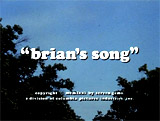


Brian's Song (1971) (TV), 73 minutes, D: Buzz Kulik



Carnal Knowledge (1971), 97 minutes, D: Mike Nichols
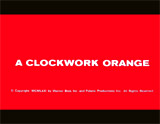



A Clockwork Orange (1971, UK), 137 minutes, D: Stanley Kubrick
Director Stanley Kubrick provocatively adapted Anthony Burgess' famous novel with this glossy, stylish, graphically-violent, controversial, futuristic, science-fiction satire. It was about the effects of crime and punishment (aversion therapy and brainwashing against violence) on a British teenaged punk named Alex (Malcolm McDowell). After a night of hooliganism with his vicious gang of droogs, including gang rapes and beatings, the sadistic was Alex was apprehended. In a grim, unorthodox governmental experiment, he was re-programmed, through his love for Beethoven's music, to reject violence, but he was dehumanized in the process of being cured. Vengeance was revisited upon him by his former victims after he was released into the society.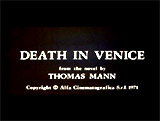

Death in Venice (1971, It.) (aka Morte a Venezia), 130 minutes, D: Luchino Visconti
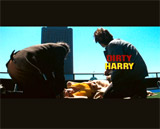




Dirty Harry (1971), 103 minutes, D: Don Siegel
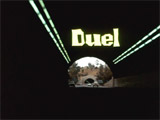
Duel (1971), 90 minutes, D: Steven Spielberg


The Emigrants (1971, Swe.) (aka Utvandrarna), 148 minutes, D: Jan Troell



Fiddler on the Roof (1971), 180 minutes, D: Norman Jewison



The French Connection (1971), 104 minutes, D: William Friedkin
William Friedkin's action-packed, intense, gritty, Best Picture-winning crime thriller was filmed on location and based on a true story about one of the largest narcotics seizures of all-time (in 1962 when 120 pounds of pure heroin worth $32 million, were confiscated after being smuggled into the country hidden in a vehicle). The screenplay by Ernest Tidyman about a crackdown on a multi-million dollar international dope smuggling ring was based on Robin Moore's best-selling 1969 book The French Connection. The crime classic starred two hard-nosed, vulgar New York City police cops who exposed an international, heroin-smuggling operation based in Marseilles - headed by suave, elusive, mastermind crime boss Alain Charnier (Fernando Rey). The film opened with Charnier's hit-man/henchman Pierre Nicoli (Marcel Bozzufi) callously murdering a French detective in Marseilles. The action shifted to NYC, where passionate, tough, pushy, and unorthodox narcotics detective Jimmy "Popeye" Doyle (Best-Actor winning Gene Hackman) recklessly and obsessively fought crime with his partner Buddy Russo (Roy Scheider). On a hunch after viewing the suspicious flashing of money in an Eastside club, the two plainclothes cops tailed the suspect, Salvatore "Sal" Boca (Tony LoBianco) to a candy store front, who later was found to be associated with Jewish mafia boss Joel Weinstock (Harold Gray) - a major financial backer of the illegal importation of drugs. Shoot-outs, chases, stalkings, and other tense scenes included the breath-taking, famous elevated-railway scene of Doyle fearlessly borrowing a car and narrowly dodging traffic and bystanders below to give chase (in Bensonhurst) after the runaway train commandeered by Pierre Nicoli. The drugs were ultimately found cleverly hidden in the rocker panels of a Lincoln Continental Mark III owned by leading French TV personality Henri Devereaux (Frederic De Pasquale). A duplicate car was released, and Charnier drove it to an old factory on Wards Island to meet Weinstock and deliver the drugs for the payoff. The story ended with a massive ambush and shoot-out, resulting in Boca's killing and Weinstock's arrest. When Doyle and Buddy pursued Charnier through a subterranean warehouse on Wards Island, federal agent Mulderig (Bill Hickman) was accidentally killed by Doyle. The elusive Charnier (who evidently slipped away and was never caught) was disturbing to Doyle: ("The son of a bitch is here. I saw him. I'm gonna get him"). The film deliberately concluded on a mysterious note and with a failed denouement. A sequel four years later, French Connection II (1975), chased Charnier to Marseilles.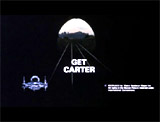


Get Carter (1971, UK), 111 minutes, D: Mike Hodges
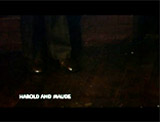


Harold and Maude (1971), 90 minutes, D: Hal Ashby
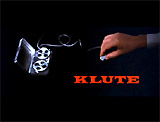




Klute (1971), 114 minutes, D: Alan J. Pakula
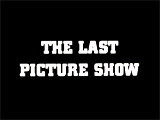


The Last Picture Show (1971), 118 minutes, D: Peter Bogdanovich
Director Peter Bogdanovich's bleak, black and white cinematic modern-day classic was based on the novel by Larry McMurtry. It was set in the small, northwestern (fictional) Texas town of Anarene in the period between the end of World War II and the Korean War in the early 50s. The poignant, coming-of-age tale was about the loss of innocence for teenagers in the slowly-dying town, symbolized by the closing of the local picture palace, owned by Sam the Lion (Ben Johnson). It told about a pair of HS football players, seniors Sonny Crawford (Timothy Bottoms) - who had an affair with the lonely football-basketball coach's wife Ruth Popper (Cloris Leachman), and Duane Jackson (Jeff Bridges) - who dated the sexy, self-centered, spoiled student beauty Jacy Farrow (Cybill Shepherd in her film debut) and then enlisted after being dumped. Other desperate townsfolk were also having affairs - Jacy's loose mother Lois (Ellen Burstyn) with oilfield worker Abilene (Clu Gulager).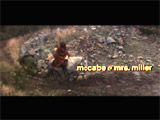

McCabe & Mrs. Miller (1971), 120 minutes, D: Robert Altman
Iconoclastic and offbeat director Robert Altman's classic, dark-toned, moody, and dramatic anti-Western (including a love story) was based on the novel McCabe by Edmund Naughton. The dimly-lit, lyrical and cynically-bleak tale about a struggle for survival presented the American dream gone sour, in a revisionist western that concluded with a prolonged shootout. Gloomy folk music from Leonard Cohen organically and hauntingly complemented the pace of the film. It also featured great cinematography by Vilmos Zsigmond - beautifully envisioned (filmed on location in Canada), with Altman's cinematographer creating an antique-like, painterly portrait of the unsightly town at the turn of the century (1902), as industrialization was occurring. A mysterious, roguish, bearded small-time, frontier drifter and two-bit gambler John McCabe (Warren Beatty) opened up a brothel/casino in the great northern, wintry wilderness settlement of Presbyterian Church - a grimy, lamp-lit and shoddy mining town. He had used his winnings to build a classy saloon-casino-brothel in the remote, makeshift Washington community. But then the film portrayed his ultimately, naive, and unsuccessful efforts to build a capitalistic business. Amiable, not-very-bright braggart McCabe, with entrepreneurish ambitions forged what he believed would be a profitable business alliance-partnership with shrewd Cockney drifter-prostitute Mrs. Constance Miller (Best Actress Oscar-nominated Julie Christie) - she would be the madam of the whorehouse and with her business savvy, she would efficiently manage the prostitutes, with a promise to transform the initial tents into a classy and professional bordello within the soon-to-be booming town. She helped to stabilize the operation and make it a successful enterprise, but she was addicted to pipe-smoked opium, and she had sex with McCabe as a paying customer. Due to his lucky success, McCabe was confronted by representatives of the Harrison and Shaunessy Mining Company that wanted to buy him out for $5,500 (the offer was increased to $6,250), but he inexplicably turned them down. McCabe stubbornly refused to be bought out by the corporate zinc mining company. He then faced the ugly consequences - the appearance of three hired enforcers: gunmen Butler (Hugh Millais), Breed (Jace Vander Veen) and Kid (Manfred Schulz). In the final celebrated sequence of a lethal confrontation set during a snowstorm, McCabe temporarily and cowardly evaded their tracking by taking refuge in the church, then shot and killed the three men, but was mortally-wounded himself. McCabe succumbed alone in a snowdrift - a victim to big business, while Mrs. Miller succumbed to her addiction to her drugs.


Nicholas and Alexandra (1971), 183 minutes, D: Franklin J. Schaffner
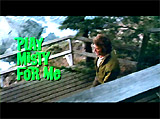
Play Misty For Me (1971), 102 minutes, D: Clint Eastwood
Clint Eastwood's first film as star and director was this suspenseful, thrilling tale of psychotic sexual obsession. It was one of the first female stalker films, an early precursor to Fatal Attraction (1987), and advertised with the tagline: "The scream you hear may be your own!" In the small town of Carmel, California, cool-talking, womanizing, all-night DJ on the jazzy, blues station KRML, mellow-voiced Dave Garver (Clint Eastwood) (or "The Big D"), would spin tunes each night for his audience of listeners. He received regular requests to play "Misty" - the Erroll Garner jazz classic, from the same "groupie" - his # 1 fan - the seductive listener/fan Evelyn Draper (Jessica Walter). While relaxing with his long-time bartender-friend Murphy (director Don Siegel in a cameo) in his favorite local pickup bar, The Sardine Factory along Cannery Row in Monterey, Dave first met Evelyn face-to-face. They returned to his place for a no-strings attached one-night stand. At the same time, unexpectedly, Dave's blonde ex-girlfriend Tobie Williams (Donna Mills) had returned from Sausalito to Carmel after 4 months away. She had broken up with Dave (with a "whole Bette Davis, through-finished-kaput scene") when concerned about his lack of commitment to her, although they would slowly rekindle their love. After Dave's one-night encounter, the increasingly-disturbing, overbearing and obsessive behavior of psycho-stalker Evelyn had already begun to exhibit itself. She dropped in on him unexpectedly, stalked him, and even appeared at his door naked. When he became direct with her about ending the 'relationship,' she revealed her borderline and irrational personality problems and developing jealousy, distrust and anger, although then later apologized, but continued to pursue him. Evelyn even internalized the pain and attempted suicide by slitting her wrists in Dave's bathroom. Over time, he became more and more terrified and upset by her when she became increasingly volatile. She vandalized and destroyed his possessions in his home, and then she viciously slashed his cleaning woman Birdie (Clarice Taylor). The threat appeared to end when Evelyn was put away in a state sanitarium, but not for long. Meanwhile, Dave and Tobie had fallen madly in love with each other. After her release, Evelyn reappeared as a possessive, obsessive, murderous psychotic mad-woman - she approached him in his place with a butcher knife ready to stab him - but only stabbed his pillow. He evaded her and saved his life, but she escaped and then manipulatively became Tobie's new roommate named Annabel (taken from Edgar Allan Poe's poem 'Annabel Lee'). In the exciting, nail-biting climax, Dave rushed to Tobie's secluded home where Evelyn had taken Tobie as a hostage and was threatening her with a pair of scissors. Arriving just in time, Dave was also slashed, but was able to punch Evelyn in the jaw, sending her through both the balcony window and the wooden railing and plunging her down to her death, onto a rocky cliff and into the ocean far below. As the film ended, his taped radio program was heard playing 'Misty' - dedicated to Evelyn (whose body was floating in the Pacific surf).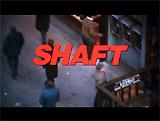



Shaft (1971), 100 minutes, D: Gordon Parks
A former photojournalist with Life Magazine, the film's director Gordon Parks became noticed as the first African-American filmmaker to direct a motion picture that was released by a major US studio - The Learning Tree (1969). The esteemed, pioneering director's next film was this landmark crime-actioner - the first major, commercial crime film with a black hero. It won an Oscar for Isaac Hayes' memorable theme song. The colorful, action-packed, slightly tongue-in-cheek film portrayed the ultra-hip, handsome, defiantly-proud police detective John Shaft (Richard Roundtree) as the black version of Clint Eastwood's "Dirty Harry" Callahan. He worked in Harlem against the Italian Mafia, and was also a "sex machine." Parks' subversive film became a major cross-over hit in the early 70s, and from then on through the end of the decade, hundreds of films would be released by major and independent studios featuring major black characters (and some black athletes such as Jim Brown and Rosie Grier), to profit from the black movie-going audiences.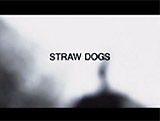




Straw Dogs (1971, UK), 118 minutes, D: Sam Peckinpah
Sam Peckinpah's unflinching, misogynistic vigilante thriller further ignited controversy over realistic screen violence and sexual abuse of women in the early 70s. In its dramatic story, it told about a married couple in a contemporary, seemingly-peaceful and idyllic rural English town in a remote area of Cornwall. David Sumner (Dustin Hoffman), a bookish, mild-mannered, shy, pre-occupied, effete American mathematician was on sabbatical with his attractive and teasingly, sexually-provocative newly-wed English bride Amy (Susan George). He was preparing to write a book on the subject of astrophysics. The two had moved into and were renting her parents' old house and property known as Trencher's Farm near her hometown of Wakely; the ruined garage was in the process of being remodeled. In town, Amy's reacquaintance with her old, lecherous ex-boyfriend Charlie Venner (Del Henney) was a portent of future trouble. There were obvious problems in the improbable marriage between the two - he was withdrawn, neglectful and condescending to her and often over-intellectualized things, while she was more vivacious, realistic, child-like and free-spirited. To incite the sexual interest of local roof construction workers, including Charlie and two other bullies - ex-convict Norman Scutt (Ken Hutchinson) and Chris Cawsey (Jim Norton), Amy removed her sweater and deliberately stood topless in full view next to an upstairs window, although her husband had cautioned her: "Don't forget to draw the curtains." The next troubling incident was David's discovery that Amy's pet cat had been strangled and was hanging by a cord in their bedroom closet. Amy immediately recognized the threat to their marriage - that the workers could easily enter their bedroom, and challenged her husband to confront the workers. The next day, instead of reprimanding and confronting the tough-talking, earthy locals, the ineffectual and hapless David sought their approval by drinking with them. Soon after, the workers pretended to be friends with David, and proposed to join him in a snipe hunting expedition into the woods; the hapless and cowardly David was fooled by the prank to lure him away, and found himself alone in a remote section of the moors. Meanwhile, in the scene preceding the rape (the first of two), the local laborer-thug Charlie was invited by Amy into her isolated farmhouse for a drink; he forcibly kissed her and although she protested unconvincingly ("Please leave me"), he removed her glasses and aggressively kissed her a second time. She screamed: "Get out!" and slapped him hard across the face. Incensed, he grabbed her and hit her hard across the mouth, and then approached her menacingly: "Don't tease me, Amy. Please." He dragged her by the hair to the sofa, as he struck her again and began tearing at her blue robe. He kissed her another time, and although she begged: "Please, Charlie," he continued to assault her by threatening, "I don't want to leave you but I will." He tore her white top, leaving her breasts exposed, before he raped her. At first, she struggled and called out "No," but then surrendered to his kisses. In some ways, she didn't resist but submitted, although she was under tremendous duress. When he held her down, ripped off her panties and began removing his shirt, she helplessly begged: "Easy," and meanwhile fantasized about her husband above her. She showed obvious enjoyment and lovingly kissed her assailant and stroked his shoulders and chest during and after being entered, and begged for comfort: "Hold me." However, she was also shedding tears, feeling both humiliated and disgraced. At the conclusion of the rape, Charlie was suddenly confronted by the barrel end of the shotgun pointed at him by his fellow workman Scutt. Scutt held Charlie at bay with a shortgun while he prepared to brutally assault David's wife in a graphic second rape sequence. Charlie was motioned to get off Amy - who screamed boisterously when she realized she was going to be forcibly raped a second time. Charlie was ordered to hold Amy down by the neck as she was violated again - from behind. In the film's climactic, stunning and barbaric bloodbath sequence, David was transformed from a meek, spineless, bullied and pacifist academic into a rampaging homicidal husband and protective home-owner to protect the sanctity of his domicile and wife ("This is where I live. This is me. I will not allow violence against this house"). He erupted cathartically with bloody violence after locals raped Amy and then as a drunken and armed group later laid siege to their house. The lynch mob threatened to invade the Sumner home in search of the mentally-deficient 'village idiot' named Henry Niles (David Warner), who had just killed a local flirtatious teenager named Janice Hedden (Sally Thomsett) and taken refuge in the house. David retaliated against the assailants with vicious scalding using boiling oil, shotgun blasts, clubbing with a fireplace poker, and the use of an antique metal "man trap" to snap around Venner's neck - his retaliation was understandably redemptive yet mostly unsatisfying. As he surveyed the carnage, he exclaimed: "Jesus, I beat 'em all."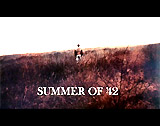

Summer of '42 (1971), 104 minutes, D: Robert Mulligan
Director Robert Mulligan's nostalgic, melancholy, war-time, New England beachside summer romance and coming-of-age tale featured Michel Legrand's recognizable, Oscar-winning dramatic score, some soft-focus cinematography, and an Academy Award nomination for Herman Raucher's Best Screenplay. The setting for the rites-of-passage romantic drama was the nostalgic atmosphere of 1940s Nantucket Island, seen in flashback 30 years later. It was narrated (with opening and closing comments) by the grown-up adult version of young, sensitive minded 15 year-old teenager Herman "Hermie" Raucher (Gary Grimes). During the summer of 1942, a time of war, Hermie and his two teenaged friends were vacationing with their families, visiting the island off the Eastern seaboard. A trio of sex-obsessed male friends included Hermie, the group's leader Oscar "Oscy" Seltzer (Jerry Houser), and nerdy, shy and immature Benjie (Oliver Conant). They often expressed their sexual awkardness and desire to lose their virginity, and perused sexual manuals to learn about sexual intercourse (and how to achieve it in 12 steps). Hermie hopelessly fell in love, at a distance with a neighbor - beautiful 22 year-old, newly-married war bride Dorothy (Jennifer O'Neill). He became acquainted with her by helping her to carry groceries, and by performing chores (such as moving boxes into the attic), after her recently-drafted husband departed for the war front. During a night at the movies (watching the romantic drama Now, Voyager (1942)), Hermie was with Aggie (Katherine Allentuck), while Oscy chose to accompany flirtatious Miriam (Christopher Norris); Benjie was too fearful of the opposite sex to stick around; during the film's screening, both Hermie and Oscy awkwardly made out with their young dates; humorously, Hermie wrongly believed he was stroking his date's breast, but it was actually her arm. During one comical vignette, in preparation for a beach marshmallow roast (and possible sexual contact with their dates), Hermie was coaxed into nervously purchasing a condom from an unsympathetic storeowner. A tearjerking romance and sexual awakening occurred for Hermie when he visited Dorothy one evening. As he entered the dimly-lit house, a phonograph needle was stuck on a record; in the living room, he noticed a bottle of alcohol and a glass, and an ashtray stuffed with cigarette butts; he discovered that Dorothy had just learned via a government telegram that her husband had been killed in action (his plane was shot down over France). W ith tears in her eyes and slightly drunk, she put her head on Hermie's shoulder, and slowly danced (barefooted) with him to the tune (the film's theme song) playing on a phonograph record. She also tenderly kissed him a few times. After kissing him (as the phonograph needle reached the end of the record), with only the sound of the waves on the soundtrack, she wordlessly beckoned him. She took him by the hand, and led him to her bedroom for comfort, where she slowly removed her white slip over her head, prepared the bed, and then removed her bra and panties before they gently entered her bed naked together. When Hermie left her later that evening, she was outside on the porch in a robe, smoking a cigarette; she gave him a simple "Good night, Hermie" - and that was the last time he saw her. The next day, when Hermie returned to Dorothy's beach house, he saw that she had left a note for him (inside an envelope attached to the front door); he sat down on the porch to read it. She explained (in voice-over) that perhaps the meaning of the event would come to him in time, and she hoped that he would not face senseless tragedies in his life: ("Dear Hermie: I must go home now. I'm sure you'll understand. There's much I have to do. I won't try and explain what happened last night because I know that, in time, you'll find a proper way in which to remember it. What I will do is remember you. And I pray that you be spared all senseless tragedies. I wish you good things, Hermie. Only good things. Always, Dorothy"), to the swelling sounds of Michel Legrande's theme music. A final bitter-sweet and sentimental voice-over came from the Narrator, middle-aged Herman Raucher (voice of Robert Mulligan), as he thought back to that fateful summer of 1942: "I was never to see her again. Nor was I ever to learn what became of her. We were different then. Kids were different. It took us longer to understand the things we felt. Life is made up of small comings and goings. And for everything we take with us, there is something that we leave behind. In the summer of '42, we raided the Coast Guard station four times, we saw five movies, and had nine days of rain. Benji broke his watch, Oscy gave up the harmonica, and in a very special way, I lost Hermie forever."


Sunday, Bloody Sunday (1971, UK), 110 minutes, D: John Schlesinger
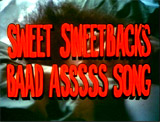



Sweet Sweetback's Baad Asssss Song (1971), 97 minutes, D: Melvin Van Pebbles
Melvin Van Peebles served as financier, producer, writer, musical scorer, and star of his own low-budget first effort. Actor/director/writer Melvin Van Peebles' X-rated, confrontational cult film was the first true blaxploitation film - it was specifically designed to upset white audiences (advertised with "Rated X by an All-White Jury"), with Peebles himself playing the part of the sex-hungry, violent anti-hero. The successful independent film (budgeted at $150,000) was released by independent distributor Cinemation, and aimed at urban black audiences. It was an anti-White, anti-authority diatribe - explained in the film's opening: "This film is dedicated to all the Brothers and Sisters who had enough of the Man...Starring: The Black Community." It caused tremendous controversy for its militancy, under-age sex, anti-white sentiment, revenge-themes, and violence, although it was one of the most important black American films of the decade. As the first commercially-successful black-themed film, Peebles forced Hollywood to acknowledge the monetary potential of the untapped, urban African-American market. There were many examples of jump-cuts, experimental lighting, freeze-frames, tinted and overlapping images and montages as it chronicled the successful (uncharacteristically) flight of a black fugitive nicknamed "Sweet Sweetback" (due to his large-sized manhood and insatiable sexual prowess) through Los Angeles - and toward and across the Mexican border. It was exceptional that a vengeful black man (after witnessing corrupt police violence and almost beating two officers to death) could survive as a fugitive, as happened in the film.


10 Rillington Place (1971, UK),111 minutes, D: Richard Fleischer
This was an exceptional biographical crime drama - a treatise against capital punishment, - with a tagline which asked the question: "What happened to the women at 10 Rillington Place?" The story, set in London in 1949, was about a monstrous, psychopathic British serial killer named John Reginald Christie (Richard Attenborough). It first went back a few years in time to show how the notorious, soft-spoken Christie lured his female victims by impersonating a medical expert. He would knock them out (with gas), strangle and rape them, and then hide their corpses in his home or bury them in his garden. Then, it told about new tenants, dim-witted and illiterate Tim (John Hurt) and pregnant wife Beryl Evans (Judy Geeson) with a newborn named Geraldine, who rented rooms above apt. manager Christie's row-house apartment. Christie took advantage of the indigent and pregnant Beryl, who was desperate for an abortion ("termination"), with the help of his complicit wife Ethel (Pat Heywood). During the 'operation,' he raped and murdered Beryl, then framed the killing on Tim (who was convinced to flee by train), and also strangled the baby. When Tim was apprehended by police, he unaccountably confessed to both murders (with three signed confessions), without pressure or coercion - and he was charged with the killings. During the trial, a complete miscarriage of justice, there was powerful circumstantial evidence against Tim (he had approved his wife's abortion), while Christie denied any involvement (although evidence of his prior crimes of violence and theft demonstrated his lack of credibility). Most damning, Tim couldn't explain why he had confessed to a crime he didn't commit, and he was blamed for the killings. As an innocent man, he was unjustly sentenced to death, and although it was ruled that he was mentally incompetent, he was hanged in 1949. A few years later, graphic evidence surfaced that Christie was still murdering women (including his wife Ethel) and hiding bodies in his apartment. He was deemed responsible for the Evans' family killings. After Christie's trial, he was hanged to death in 1953. In the 1960s, Tim was given a posthumous official pardon (but his conviction remained on the books), and he was reburied.

Two-Lane Blacktop (1971), 102 minutes, D: Monte Hellman




Walkabout (1971, UK/Australia), 95 minutes, D: Nicolas Roeg
Cinematographer Nicolas Roeg's first-directed film exhibited his visual story-telling roots. Two siblings became stranded in the hostile Australian outback after their father committed suicide. They faced a bleak future in the wild grip of nature, and were forced to struggle to survive in the hot desert sun outside of civilization. Their past stark urban world of high-rises was contrasted with the visually stunning scenery and magnificent wildlife photography of indigenous creatures, including kangaroos, lizards, snakes, and scorpions. A resourceful aboriginal boy conducting his solitary 'walkabout' rite of passage saved the two children, as they frolicked in nature, but ultimately found themselves out-of-place in the film's tragic ending.

Willy Wonka and the Chocolate Factory (1971), 100 minutes, D: Mel Stuart
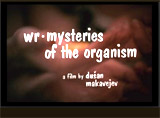




W.R.: Mysteries of the Organism (1971, Yugo/W. Germ.) (aka W.R.: Misterije Organizma), 85 minutes, D: Dusan Makavejev